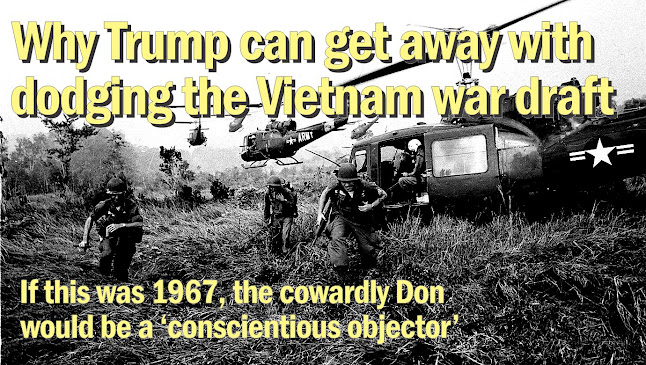Chaotic scenes at the Kabul international airport
are not only reminiscent of the fall of Saigon in 1975, it is emblematic of the
similarity of missions between those two wars.
In an epic pointless battle fought over Hill No. 937, a highly-fortified
ridge in Central Vietnam near its western border with Laos, American soldiers bled and died in repeated
efforts just to set foot on its summit. They would fight Vietcong guerillas fiercely
in the morning, secure the hill by noontime, only to head down back to the base of
the mountain in the afternoon.
Memorialized in a 1987 movie “Hamburger Hill” it
popularized the cynical explanation for taking a worthless piece of combat real
estate—“because it’s there.” It’s
the same nonchalant justification alpine climbers give when asked why they
climb a tall mountain—“because it’s there.” But summiting Mount
Everest, for example, is a celebration of the triumph by the indomitable human
spirit. In contrast, making it to the top of Hamburger Hill bristling with 200
pounds of ammo was just an exercise of getting rid of all that weight. It had
no sense, no meaning, no redeeming purpose whatsoever—just like the whole of
the Vietnam war itself. It was a war to
slake the thirst of the Joe McCarthy’s in the US Congress who imagined a “communist”
getting ready to knock on American doors any time soon, back in the day. Otherwise, controlling south Vietnam meant less
than nothing in the geopolitics of the era. If America was just looking for “communists”
to spook themselves silly, Cuba’s Fidel Castro was just a hundred miles south of
Florida.
Afghanistan is the same worthless wasteland, maybe even worse. It
didn’t have rich oil deposits beneath its treeless sandy flats, no mineral mines
in its inhospitable mountain ranges, it had practically zero agriculture. The
only livestock it had were camels that had zero chance of landing in the world’s
gourmet plates.
All that Afghanistan was is a chopping board of
American foreign policy. Three presidents before Joe Biden—two Republicans and
a Democrat—had only looked to Afghanistan for demonstrating “political will” in
staying the course of “keeping the flame of democracy” burning fervently worldwide.
For the giant military industrial complex, it was a war to guarantee arms sales
for years to come. And for the trigger-happy war junkies among US generals, it
was a grownup’s sandbox for playing “winning the hearts and minds” of a
primitive Islamic society.
At least, at the end of World War II, the American
G.I. was a celebrated hero in many European countries, whose governments to
this day still keep well-groomed American cemeteries for fallen US soldiers who
had liberated them from Nazi Germany. America’s
global chivalry—some say fool’s pride—fueled the Marshall Plan to rebuild
wartorn Europe and get their economy back on its feet. To be sure, benevolence
was part of it, but more importantly the so-called “peace dividend” guaranteed
that the European consumer society would become America’s biggest postwar
market for decades. At the same time, a firm grip on its NATO allies gave the
US a high ground overview of the entire continent. American foreign policy
called this the anti-Soviet trip wire, very critical in sandbagging Soviet
expansionism during the Cold War. In so many ways you could not count, US
military presence in Europe was a no-brainer presumption.
Uncle Sam liberated most of Northern Africa, too. But
you don’t see the US wasting any breath holding on that equally worthless piece
of territory. In Asia, China—yes, the pre-Mao Zedong variant—South Korea and the
Philippines are three countries that still bear fond memories of “Victory Joe.” But these countries don’t have to be occupied,
their societies embraced Hollywood and the internet they are joined at the hip
with western culture and psyche.
But what has America got to do with the Afghan mujahideen? Nothing. That’s why the
Afghan war is the quintessential puzzle wrapped in a mystery surrounded by an
enigma. Agfhanistan is not even communist—in fact, godless Marxism is the
opposite extreme of medieval Islamic puritanism. The US doesn’t have to worry
about Afghanistan embracing China—they’re not even interested, there’s nothing
in Afghanistan China can grab and sell.
America doesn’t have to fear any religious or cultural invasion from
Afghanistan, either. Anglo-Saxon Islamophobia is thriving so well on its own in
America, the only thing Afghans can sell Americans is a kashmir sweater.
Observers think Joe Biden is making a huge mistake
by coming out publicly and owning up the decision to pull out of Afghanistan. I
give him more credit and savvy than that—he didn’t even give Donald Trump a
split-second chance to say, “hey, I thought of that first!” In fairness, he did.
Joe Biden knows his countrymen too well. Americans
are puritans in public, perverts in private. Their opinion makers will hone
their word-bending skills criticizing him in the open, but muttering inwardly, “By
golly, Joe, it’s a wonderful thing you’ve done for all of us!”
Now even South Korea is sitting on the edge of its
seat. Having seen what happens when a regime sponsor pulls out, they will
capitulate to every US demand from hereon—including underwriting the enormous
cost of its own defense, which American taxpayers have been footing the bill
for much too long.
And don’t even get me started on Israel. ©
2021 Joel R. Dizon
Joel R. Dizon - PARABLES AND REASON





No comments:
Post a Comment